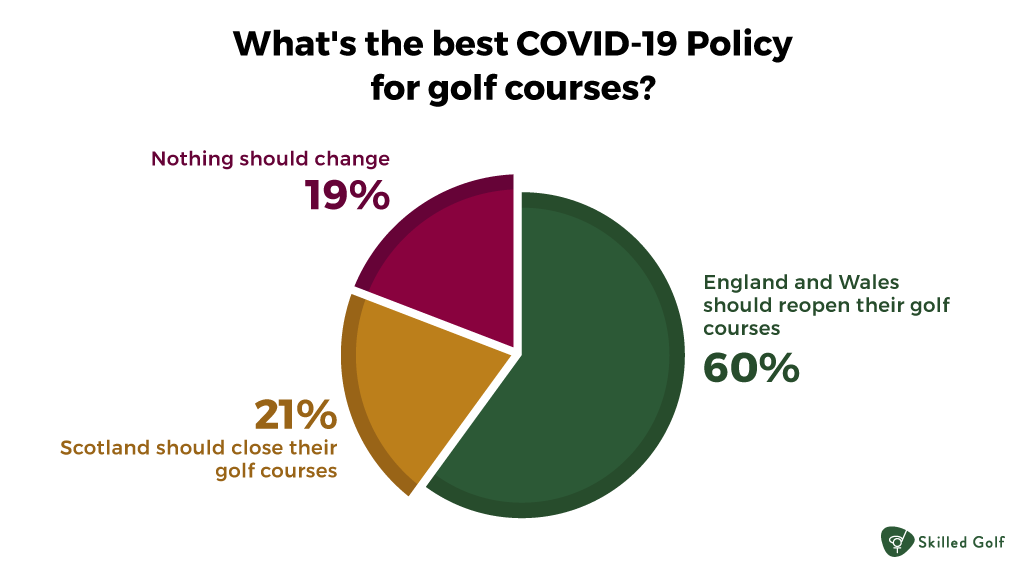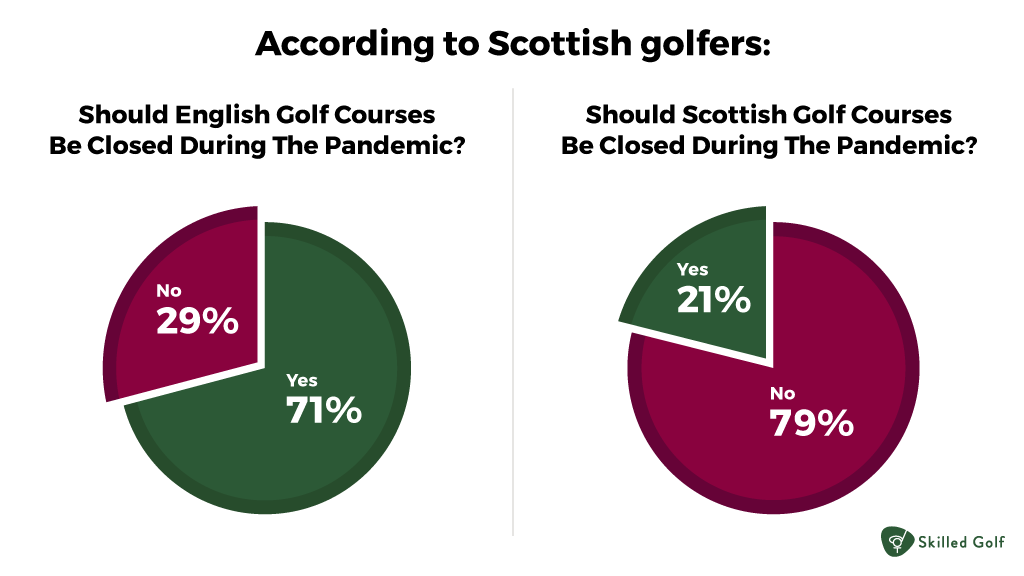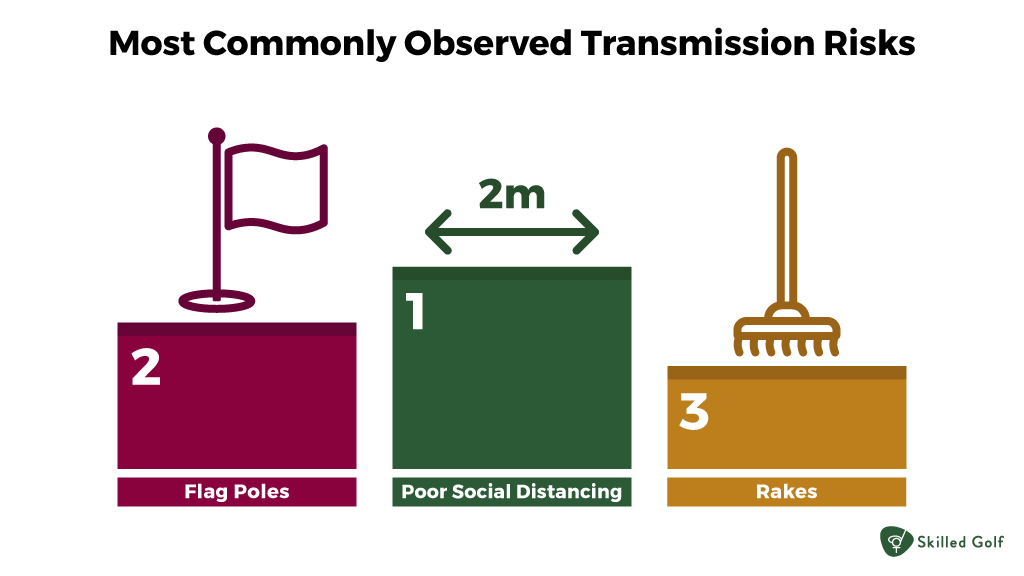We surveyed 1,000 golfers across Britain to ask them about golf course closures and coronavirus transmission risks.
At the time of writing all Scottish golf courses are open to parties of two while all English courses are closed.
This has resulted in many Scottish courses having their busiest January ever. Many long time members report struggling to book a tee time. Slots are being snapped up just seconds after they are released.
It’s clear that the two countries have a drastically different approach to golf. That naturally begs the question: Is the Scottish approach safe or does more need to be done to control the virus?
Here’s what we found.
At A Glance
- When asked, 60% of golfers want to see courses reopen in England & Wales immediately.
- When broken down by country, 56% of Scottish golfers want their courses to remain open while keeping English courses shut.
- Conversely, only 20% of English golfers want to see Scottish courses shut.
- More older golfers (Over 60’s) want Scottish courses closed than younger golfers (18-44), but only 3% of middle-aged (45-60 ) golfers want Scottish courses shut.
- When asked, 18% of golfers openly admit to witnessing coronavirus transmission risks on the course with flagpoles and crowded 1st tees being called out as main culprits.
Who did we ask?
We surveyed 1,000 golfers across Great Britain. In order to get a bigger picture understanding, we first categorized them into 4 age groups: 18-29, 30-44, 45-60 and over 60’s.
Then, we asked them whether they lived in Scotland or in England & Wales.
The respondents were asked a series of questions about their views on golf course closures, transmission risks while playing golf and the different frameworks set out to protect the public from the virus by their respective governments.
Oh, and don’t worry. The survey was done 100% online so that no virus transmission risk was created from our work.
British golfers believe golf courses should remain open despite the pandemic
We found that 60% of golfers across Britain want all courses open immediately. Many cited low risk factors associated with golf being outdoors and social distancing being easy to follow in practice.

Many golfers pointed out that golf is exercise for them and want to keep playing to stay healthy. This makes sense when factoring in that the average golfer walked over 4 miles while playing a round.
But they also understand it may create additional unnecessary risk
21% of respondents thought that Scottish courses, which have remained open since May, should be closed. Many of this group were worried that Scottish courses remaining open presented an unnecessary risk.
One respondent pointed out that “the virus does not discriminate“. While another suggested that the rest of the public were doing their bit to control the virus, so golfers should too.
This theme of treating Scotland and England differently played out throughout our results. Several English golfers suggested the decision may be political. Comments like “Scotland likes to be different” came up frequently in our results.
Interestingly, 19% of golfers felt that Scottish courses should remain open while English courses should remain closed.
It probably comes as no surprise that a disproportionate number of golfers with this viewpoint came from Scotland. It’s hard to ignore the disparity in these numbers across the two countries.
Scottish golfers believe their courses should remain open while English courses should remain closed
When asked, 79% of Scottish golfers said they want their courses to remain open while 71% went to to say they believe English courses should be kept shut.

On the other side of the border, only 20% of English golfers want to see Scottish courses shut. We’re left wondering if this is a case of double standards.
Some Scottish golfers surveyed claimed that Scotland took the situation more seriously in Autumn last year and the firebreak lockdown that started in October meant that cases per million in Scotland have remained lower than in England by a long way.
Several English golfers theorized that the extra space in Scotland could help minimize the risk of transmission on the course.
England has a population density of 275 people per square kilometer, whereas Scotland has just 65. We’re not sure if this statistic translates to a legitimate threat variance on the course though, as most golf courses are not very crowded spaces.
One golf course employee in Scotland noted that this has been their busiest January ever. This may be because so few people are abroad, meaning all of their members are looking for a local tee time.
Don’t be mistaken. Restrictions are far from lax In Scotland, and golf is one of the few social activities that are allowed outside of your household. This is driving a lot of fair weather golfers to get out their waterproofs and get a round in.
Old & Young Golfers comply while Middle-aged golfers resist
More older golfers (60+) want Scottish courses closed than younger golfers (18-44), but only 3% of middle aged (45-60 ) golfers want Scottish courses shut.

Golfers aged over 60 were more likely to favor closing Scottish courses. 30% believed this to be the best course of action.
Interestingly, middle aged golfers (45-60) were the opposite. Only 3% thought Scotland should close its courses.
This 10 fold difference surprised us. It makes sense that older golfers who are more vulnerable to the effects of the virus would be more cautious. But 45-60 year olds seemed to throw caution to the wind.
By contrast, more younger golfers were also in favor of closing courses. 21% of 18-29 year olds and 23% of 30-45 year olds. These groups are far less vulnerable themselves but may be looking out more for older members of their communities.
Where are you most likely to catch coronavirus on a course?
18% of golfers report witnessing coronavirus transmission risks on the course with flagpoles and crowded 1st tees being called out as frequent culprits.
Fewer than 1 in 5 golfers reported witnessing coronavirus transmission risks on the course with only 18% said they had witnessed this first hand. That said, we’ll need to factor in the inherent biases behind this question here.
It’s very unlikely that anyone would openly admit to breaking the rules given the harsh repercussions.
The prime culprit was flagpoles being touched by multiple golfers. Many golf courses in Scotland have changed their club rules to force golfers to leave the flagpole in the hole at all times.
In theory, this would address the #1 transmission risk witnessed, although as many respondents pointed out, these rules only work when common sense is adhered to.

A mere 5% of golfers reported witnessing poor social distancing at least once, particularly at busy points on the course such as the first tee. As I’m sure you’re aware by now, the NHS advises people to stay at least 2 meters away from others outside their household.
One golfer made a specific point about paying using chip & pin being an issue as the pin pad could be a transmission point, although you could argue this is an issue in many environments and not inherent to golf.
This is less likely to be an issue at the moment though, as pro shops are closed and most payments are being taken online for golfing in Scotland.
Several golfers mentioned that while clubhouses were open for a period last year, they regularly witnessed poor social distancing inside, however none of these same respondents witnessed poor social distancing outside on the course, perhaps indicating that a measured, proactive approach is better than total course closure.
Will Scotland and England ever agree?
I don’t need to tell you that restrictions are needed to curb this virus. Just how far we need to go is up for eternal debate, however.
An overwhelming majority of Scotts back the decision to leave their courses open while 56% of them also agreed English courses should remain closed.
While many will be quick to put this down to bitter patriotism, the numbers don’t lie: Per Capita Scotland sits firmly below England and Wales in terms of both positive tests and deaths.
Does this entitle them to a more lax set of restrictions, particularly when it comes to golfing?
Even the nation itself is divided on that. The older and younger generations seem to take a more cautious approach, while the boomer generation throws caution to the wind.
One thing I think all generations and nations can agree on is that normality can’t come soon enough.
Full Media Kit
- ⬇ Download Media Kit PDF

